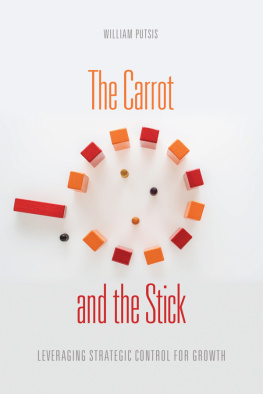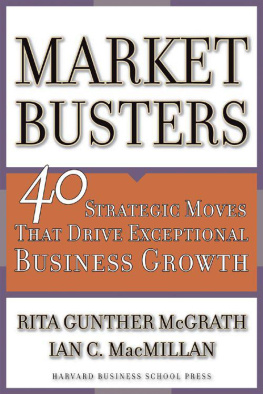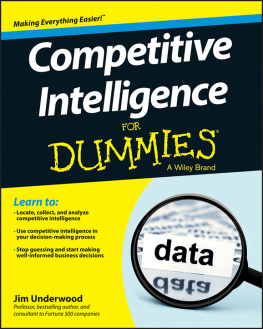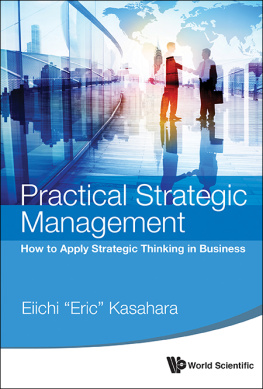
Contents
Praise for Compete Smarter, Not Harder
In today's technology-driven, readyfireaim business environment, competitive strategy is all too often left behind by the push to deliver the next shiny thing. Real competitive strategy is about prioritization; most important, prioritization that wins for customers, thereby winning for the business. Compete Smarter, Not Harder is on target with its simple steps to ensure the business prioritizes its efforts in an effective, efficient manner, and most important, excludes those things that are not within the strategy and only distract or divert the business. This book does a great job illustrating the importance of knowing where and how to compete. Bill's stories resonate and clearly illustrate those business principles that define success while pointing out the fallacies that are often employed as fact when making business decisions. Make this book part of your business education and keep it in your reference library.
Greg Bowlin,
Strategia Global, LLC., and formerSenior Vice President and Chief Strategy Officer for Jeppesen, Inc.
This book delivers high-quality service to both scholars and practitioners. From a research perspective, it demonstrates step-by-step analysis of how to make strategic decisions on where or where not to compete in such a rapidly changing market as today, based on the process of screening for priorities. Meanwhile, it also provides specific solutions for a practitioner like me when it comes to making real and critical decisions.
Some traditional books about marketing or strategy are highly focused on one or few specific regions or customers. However, this book seeks for a universal solution by drilling into the core of competing in the right market, in the right part, for the right customers, with the right incentives, and with the right offering. Therefore, the principles and tools can be utilized worldwide without boundaries, in the United States, China, and anywhere else.
The thought-provoking principles and tools is not elaborated in a traditional way. It is quite impressive that the book is filled with vivid examples and logical statements. The examples cover from literature, relevant theories, to the business world.
Making strategic decisions sometimes is so critical and highly related to the fortune of the entire organization. The book would enrich practitioners' minds by making important contribution to their understanding about what to focus and hence the quality of strategy decisions.
Kehai Xie,
Senior Vice President and Chief Human Resources Officer of Peking University Founder Group Co., Ltd.

Cover design: Paul McCarthy
Copyright 2014 by Dr. William Putsis. All rights reserved.
Published by John Wiley & Sons, Inc., Hoboken, New Jersey.
Published simultaneously in Canada.
No part of this publication may be reproduced, stored in a retrieval system, or transmitted in any form or by any means, electronic, mechanical, photocopying, recording, scanning, or otherwise, except as permitted under Section 107 or 108 of the 1976 United States Copyright Act, without either the prior written permission of the Publisher, or authorization through payment of the appropriate per-copy fee to the Copyright Clearance Center, 222 Rosewood Drive, Danvers, MA 01923, (978) 750-8400, fax (978) 646-8600, or on the web at www.copyright.com . Requests to the Publisher for permission should be addressed to the Permissions Department, John Wiley & Sons, Inc., 111 River Street, Hoboken, NJ 07030, (201) 748-6011, fax (201) 748-6008, or online at www.wiley.com/go/permissions .
Limit of Liability/Disclaimer of Warranty: While the publisher and author have used their best efforts in preparing this book, they make no representations or warranties with the respect to the accuracy or completeness of the contents of this book and specifically disclaim any implied warranties of merchantability or fitness for a particular purpose. No warranty may be created or extended by sales representatives or written sales materials. The advice and strategies contained herein may not be suitable for your situation. You should consult with a professional where appropriate. Neither the publisher nor the author shall be liable for damages arising herefrom.
For general information about our other products and services, please contact our Customer Care Department within the United States at (800) 762-2974, outside the United States at (317) 572-3993 or fax (317) 572-4002.
Wiley publishes in a variety of print and electronic formats and by print-on-demand. Some material included with standard print versions of this book may not be included in e-books or in print-on-demand. If this book refers to media such as a CD or DVD that is not included in the version you purchased, you may download this material at http://booksupport.wiley.com . For more information about Wiley products, visit www.wiley.com .
Library of Congress Cataloging-in-Publication Data:
Putsis, William, 1959
Compete smarter, not harder : a process for developing the right priorities through strategic thinking/Dr. William Putsis.
pages cm
Includes index.
ISBN 978-1-118-70871-2 (cloth); ISBN 978-1-118-74702-5 (ebk): ISBN 978-1-118-74716-2 (ebk)
1. Strategic planning. 2. Target marketing. 3. MarketingManagement. I. Title.
HD30.28.P8678 2013
658.802dc23
2013016302
Priority

noun (pl. priorities)
a thing that is regarded as more important than another.
Introduction
Priority
The art of the wise is knowing what to overlook
William Blake
I know you recognize the following story. The names and situation may be different, but the story is the same, for it plays out all the time inside of companies around the globe:
| Scene: | A conference room inside a company's office with managers sitting around an oval conference table. |
| Issue: | Deciding on a future strategic direction and customer base. |
| Manager 1: | We have a great offering that would fit perfectly with segment X, where market growth rates are off the charts. |
| Manager 2: | No, we need to go after market Y; the margins with this group are incredible. |
| Manager 3: | You're both wrong! We can't alienate our core. The largest market by far is Z, so our focus should be here. |
| Manager 4: | Our budget allocation for next year is constrained; how are we even going to fund this expansion? Perhaps we need to think about reorganizing. |
We've all lived these conversations. Who usually wins? The person who wins is typically the one with the highest position on the org chart, the one who controls the budget, or who talks the loudest. But who should win? The one who's right.
Today more than ever, companies need to make choices about allocating scarce resources. Not only must they decide in what part of the market they should compete, but they must also adopt the right tactics for the part of the market in which they are competing. Moreover, just as important is the need to determine where not to compete. Doing precisely thissetting the right priorities at every stage of the process, from the 30,000-foot view of strategic vision to the detailed in the weeds tactics on the groundis what good companies do at every step. How to set priorities at every decision point is what this book is about.
Next page









